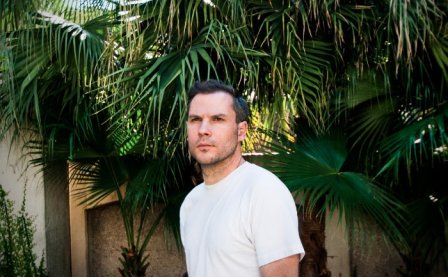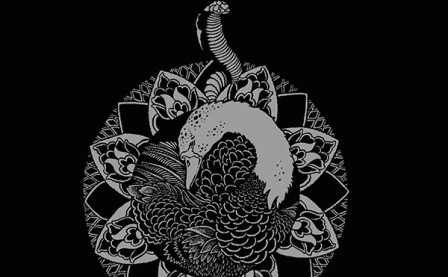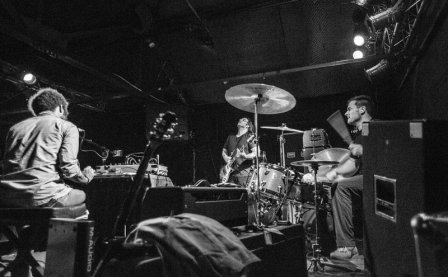I first saw OM at I.D.E.A.L. Fest in Nantes in April. They take their name from that humming sound made by the meditating, so I was expecting something chill, something soothing. New-Agey even. After the first seven-minute bath of grimy distortion, I realized they deliver that shamanic vibe, but not by placating the senses. They overload them. Overflowing is a form of emptying, I suppose, and that's what took place at this show: a sonic bombardment, a dark surf of overdrive and bass tone gradually overtaking and crumbling me, as I if I were a sand castle on a desolate beach. The delay and reverb disconnected the sounds from the musicians making them. Alex Cisneros' strums on the bass didn't correspond to the wretched cascades of sound that flooded the room, making him and drummer Chris Hakius seem as much objects of the performance as authors of it. The record proves to be a cleaner version of that concert experience, a high church rendering of the backwater baptism. Conference of the Birds is a pristine bomb bursting in one evenly paced, fifteen-minute explosion with an equally long aftershock that blazes, razes, and settles in a cloud of ash.
As it demolishes, it evangelizes. I like to think that Conference of the Birds' two giant songs comprise a decelerated, elastic liturgy. Bass tones swivel upward like delicious smoke and Cisneros intones his transcendental, grammatically corrupt lyrics with a muted fervor. On "At Giza," the raw matter of high speed metal riffs ”” normally molded into sharp ordnance and angrily sprayed at the listener ”” is stretched to rich, elastic putty, studded with glass and nails. On "Flight of the Eagle," they turn the dial up on the gain and the bass drones like an army of killer bees in your ear canal, swerving and diving through hulking grooves.
The indeterminacy of the lyrical content and the Hindu roots of the band's name indicate that typical dichotomies don't apply well here ”” death and resurrection, yin and yang, good and evil are poles of the mythic world that many metal bands inhabit. Instead of depicting the drama of malevolent agents, be they gods, demons or murderers, OM concern themselves with atmosphere. They immerse themselves (and the listener) in the mystical instead of the mythic. They sculpt an animated stasis, a writhing repose. It's devoid of conflict and surging with tension. I think it's lovely stuff.
A record that envelops, destroys, and (maybe) sanctifies. Play it at high volume, alone, in a dark room.
1. At Giza
2. Flight of the Eagle
More about: OM




